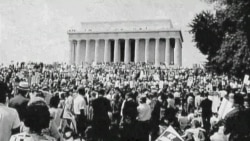Fifty years ago, Rev. Martin Luther King Jr. led a march that changed the lives of all Americans. On Aug. 28, 1963, King delivered his famous "I Have a Dream" speech to a crowd of more than 250,000 people in Washington. The event turned out to be a watershed moment in American history.
"I don't think any of us expected a speech quite as dramatic as we heard. It just touched everyone to their heart," said Dick Miles who was among the many white people attending the march.
The quarter of a million people who flooded Washington that day marched for equal rights and jobs. The demonstration came at a time of great racial unrest, as the country sought to end long-entrenched laws that discriminated against African-Americans.
Rev. Jesse Jackson said Martin Luther King had a clear vision of the symbolism of the march.
“The dream was to lift our spirits, and that was very successful,” Jackson said. “Moving us toward getting freedom."
While those who attended the gathering say the atmosphere was festive, many historians agree the march was also a powerful statement that racial discrimination had to end.
"For the first time in our history we could all come together and speak with one voice and to me that is the most powerful thing that ever happened," said Rev. Willie Blue.
King use the gathering to deliver what would become his most famous speech, casting a spotlight on African-Americans' struggle to eliminate racial segregation and discrimination.
The most stirring moments of the speech came when King spoke about his personal aspirations for the nation.
"I have a dream that my four little children will one day live in a nation where they will not be judged by the color of their skin but by the content of their character. I have a dream today."
"He transformed those marble steps of the Lincoln Memorial into a modern day pulpit, and I remember him saying I would dream today a dream deeply rooted in the American dream," said Congressman John Lewis, who also spoke at the march.
Lewis remembers that, as people departed from the march, civil rights leaders met at the White House with President John Kennedy.
"That afternoon President Kennedy invited us back down to the White House,” he said. “It was like a proud beaming father -- he said to each one of us, 'you did a good job, you did a good job', and, when he got to Dr. King, he said 'and you had a dream."
"I don't think any of us expected a speech quite as dramatic as we heard. It just touched everyone to their heart," said Dick Miles who was among the many white people attending the march.
The quarter of a million people who flooded Washington that day marched for equal rights and jobs. The demonstration came at a time of great racial unrest, as the country sought to end long-entrenched laws that discriminated against African-Americans.
Rev. Jesse Jackson said Martin Luther King had a clear vision of the symbolism of the march.
“The dream was to lift our spirits, and that was very successful,” Jackson said. “Moving us toward getting freedom."
While those who attended the gathering say the atmosphere was festive, many historians agree the march was also a powerful statement that racial discrimination had to end.
"For the first time in our history we could all come together and speak with one voice and to me that is the most powerful thing that ever happened," said Rev. Willie Blue.
King use the gathering to deliver what would become his most famous speech, casting a spotlight on African-Americans' struggle to eliminate racial segregation and discrimination.
The most stirring moments of the speech came when King spoke about his personal aspirations for the nation.
"I have a dream that my four little children will one day live in a nation where they will not be judged by the color of their skin but by the content of their character. I have a dream today."
"He transformed those marble steps of the Lincoln Memorial into a modern day pulpit, and I remember him saying I would dream today a dream deeply rooted in the American dream," said Congressman John Lewis, who also spoke at the march.
Lewis remembers that, as people departed from the march, civil rights leaders met at the White House with President John Kennedy.
"That afternoon President Kennedy invited us back down to the White House,” he said. “It was like a proud beaming father -- he said to each one of us, 'you did a good job, you did a good job', and, when he got to Dr. King, he said 'and you had a dream."





